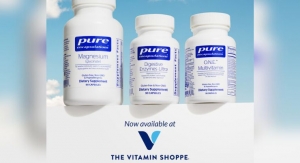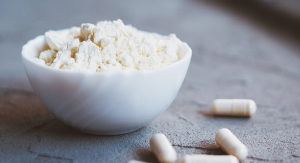Sean Moloughney, Editor03.01.17
Maintaining proper digestive health is an everyday issue that goes a long way to determining overall wellness. Consequently, natural solutions and dietary supplements offer broad appeal to consumers of all ages and backgrounds.
Poor eating habits that include highly refined and processed food items are prevalent in modern, westernized lifestyles. From excessive gas to food allergies, prolonged disruption to the digestive tract can result in inflammatory diseases.
For example, the International Foundation for Functional Gastrointestinal Disorders estimated the global prevalence rate for irritable bowel syndrome (IBS) is 10-15%.
A recent report from Transparency Market Research predicted that a high prevalence of health issues like IBS, acid reflux, diarrhea or constipation, gas, leaky gut, bloating, ulcerative colitis, malabsorption, and diverticulitis are expected to drive demand for digestive enzymes in the coming years. “These enzymes help in easing the stress on the pancreas, stomach, gallbladder, liver, and small intestine by simplifying the process of digesting fats, starches, and proteins. The increasing awareness about these facts is expected to boost the market’s growth in the near future,” analysts said.
A growing number of health conscious consumers looking for enzymes to supplement their fitness regimen and diet plans are expected to fuel the market moving forward, the report stated.
Health Catalysts
Enzymes are simple proteins found within each living cell, where they act as catalysts to regulate various biological reactions, said Shaheen Majeed, marketing director, Sabinsa, East Windsor, NJ. He quoted Dr. Humbar Santillo, the author of a book titled Food Enzymes: The Missing Link to Radiant Health, to summarize the significance of enzymes in health and nutrition: “Each of us, as with all living organisms, could be regarded as an orderly, integrated succession of enzyme reactions.”
Enzymes are an essential part of any chemical reactions that take place in the body, Mr. Majeed continued. “Various biological reactions, such as digesting food, activities of the brain, cellular energy, and repair process of tissues, organs and cells are regulated by different types of enzymes.”
All biological reactions within human cells depend on enzymes—they are necessary to sustain life, said Scott Ravech, CEO, Deerland Enzymes, Kennesaw, GA. “The role of digestive enzymes is to break down food-derived fats, carbohydrates, and proteins into smaller substances that our bodies can use. Although the body produces its own digestive enzymes, it may not be enough to completely break down cooked or processed foods. During cooking and processing, the natural enzymes present in raw foods are denatured.”
In addition, human bodies don’t produce the enzyme cellulase, said Mr. Ravech. “This enzyme breaks down the cell wall of plants, releasing the nutrients for our bodies to absorb,” he explained. “Those who follow a vegetarian or vegan diet are likely missing out on key nutrients from the plant-based foods they’re eating, and would most certainly benefit from an enzyme supplement.”
Ultimately, supplements can help to optimize the digestion process, and the complete release and absorption of food nutrients can result in fewer digestive problems, he added.
Melony Fuller, director of marketing, National Enzyme Company (NEC), Forsyth, MO, said enzymes play a big role in health and nutrition, offering the following analogy. “Everyone has heard of probiotics, right? And while they are important, digestive enzymes are the real rock stars of digestive health. Probotics have been the lead singer for digestive health for many years, while digestive enzymes were viewed as just part of the band—a misconception. Since the primary role of enzymes is to break down the food we eat into manageable pieces the body can use for nutrients, it’s hard to imagine a world without them. That world would probably be filled with many uncomfortable people facing multiple digestive issues, including occasional gas, bloating, constipation and diarrhea to name a few.”
While probiotics help maintain a healthy bacterial balance, often leading to healthier digestion and immunity, if the body has trouble breaking down food into useable components, consumers then have bigger problems to address, such as nutrient shortfalls and occasional digestive discomfort.
“How efficiently your body digests food can affect almost every component of your health, including nutrient absorption and elimination,” said Ms. Fuller. “Basically, every component of your health can be somehow attributed to proper digestion. To reiterate, digestive enzymes play one of the biggest roles in health and nutrition.
Awareness Leads to Demand
People have been aware of various health and nutritional benefits of enzymes since ancient days, according to Mr. Majeed. “Different civilizations have been using enzymes in one form or the other as a part of their everyday healthcare practices under a variety of traditional medical systems. Today, people are convinced about enzymes’ role in improving overall health and wellness in general, and gut/digestive health in particular, thanks to clinical-based evidence. As a result, demand for enzyme-based products is on the rise in the nutritional supplement industry. Further research would attract more and more individuals to embrace the enormous health benefits that enzymes offer.”
Ms. Fuller noted a learning curve when it comes to understanding the benefits of enzymes beyond digestive enzymes for food sensitivities. “Being the enzyme pioneer, NEC receives an inordinate number of questions about enzymes. For this reason, the Enzyme Education Institute was developed to share enzyme knowledge with consumers, retailers and manufacturers. There’s learning material for everyone.”
As a specific consumer group, millennials seem to have a greater sense of responsibility to be proactive with their health, she added. “For this well-informed group, introducing products with creatively communicated education about the benefits will propel enzyme awareness.”
Supplement consumers are characteristically very diligent in their research and efforts to understand how ingredients work in the body, said Mr. Ravech. “Therefore, providing educational material should be a continued focus of the successful brand marketer. We see that the more forward thinking manufacturers and retailers are making great efforts to educate consumers through their websites, retail displays, and even in-store advocates.”
Of particular importance is educating the consumer on the way enzyme efficacy is measured, he added. “Unlike traditional supplements that are measured by weight, enzymes are measured by their activity, and often in varying units. It’s important for the consumer to know that for enzyme-based supplements, more milligrams don’t necessarily equal increased potency.”
Chris Penet, vice president at BIO-CAT in Troy, VA, said the market for enzymes continues to grow, driven by consumers looking for natural alternatives and also by increasing awareness and education regarding digestive health.
“While more consumers understand the benefits and how enzymes work, it is a confusing topic for consumers. The consumer is inundated with all sorts of information from all sources. How do they know which is factual versus biased news—expert news vs. rhetoric? The more brand manufacturers can do to spread a simple, easy to understand message, the more informed the consumer will be.”
Ultimately, consumers expect ingredients to deliver functionality and health benefits along with demonstrable safety. “The regulations for new ingredients are under review,” with FDA’s New Dietary Ingredient (NDI) notification draft guidance, said Mr. Penet. “While consumer driven needs are emerging, time to market, safety testing and adherence to science-based results takes time and effort,” he added.
Benefits of proven digestive health ingredients have expanded over the years to include everyone from seniors to teenagers and high intensity athletes. “Using enzymes as natural alternatives rather than going to the doctor to get a prescription for a pharmaceutical product is becoming more favorable to the consumer as their education increases,” he said. “The consumer looks at these products as cost-effective alternatives that might help them avoid stressing their flexible healthcare spending accounts.”
Application Trends
Enzymes today are designed for their hardiness, said Mr. Penet. “The enzyme supplements and blends of today are developed using sources that allow them to be effective at the pH and environment of the stomach.”
BIO-CAT is currently investigating the effects of fat digestion in the body and its impact on health, as well as potential benefits of its probiotic OPTI-BIOME Bacillus Subtilis MB40. The industry has a long history of safe use, he added, but more clinical trials will give consumers better understanding about the benefits of enzymes.
For some people, the body’s natural ability to produce enzymes starts declining as early as age 25, said Sabinsa’s Mr. Majeed, so given their importance in many of the body’s functions, supplementation is beneficial. “The scope of enzymes has grown beyond just aiding digestive health to include weight management, joint health, circulatory health, relieving muscle soreness, to name a few.”
Digestive enzymes help balance the digestive process, particularly in people who experience chronic GI discomfort (e.g., constipation, diarrhea, cramps), support healthy immune function, and help in the breakdown of fats, proteins and carbohydrates, he added.
“The modern lifestyle takes a toll on health by contributing to a number of discomforts, contributing to disturbed activity of digestive enzymes, enzyme insufficiency etc., so maintaining adequate levels and optimal activity of digestive enzymes should be a priority.”
Sabinsa’s proprietary formulation DigeZyme is a multi-enzyme complex, incorporated with specific digestive enzymes that are clinically proven to be helpful in supporting a healthy digestive system: cellulase for fibrous food, lactase for individuals with lactose intolerance, and amylase, lipase and protease for those who have difficulty in digesting carbohydrates, fats and proteins, respectively. “It is also found to be effective in maintaining healthy body composition, and helps lower the toxic load generated by undigested food materials,” said Mr. Majeed.
In a recent double-blind, placebo-controlled clinical trial it was observed that DigeZyme was able to decrease pain associated with delayed onset muscle soreness (DOMS) induced by standardized eccentric exercise. Data suggested that DigeZyme was able to improve subjective pain and tenderness.
Another clinical study involving patients diagnosed with functional dyspepsia (FD) demonstrated that DigeZyeme significantly alleviated symptoms related to FD in comparison to placebo with no reports of adverse events.
Mr. Majeed said the future looks bright for enzyme-based supplements, as researchers focus on helping people with a condition-specific approach. “One example is enzyme supplementation to manage celiac disease, an autoimmune disorder affecting primarily the small intestine that occurs in people who are genetically predisposed to gluten. Research on synergistic action of combinations of digestive enzymes, probiotics and/or botanicals is also gaining momentum.”
Enzymes are mostly used and recognized in the health industry for their role in supporting digestion and the digestive system in general, noted Dr. Naeem Shaikh, vice president of research and innovation, NEC. “The proteolytic enzyme Serrapeptidase has shown remarkable soft-tissue support, cardiovascular, respiratory and immune support potential. When this enzyme is absorbed systemically, protease molecules bind with α-2-macroglobulin making an α-2-macroglobulin-protease complex, in turn, changing its affinity to bind certain cytokines and ultimately eliminate them from the system. This mechanism may help promote optimal cytokine balance and support immune function in the human body. Serrazimes by National Enzyme Company (NEC) utilizes this enzyme system to support healthy protein metabolism.”
Enzymes have also played a significant role in the manufacture of certain foods since the discovery of making beer from grain and cheese from milk. Lately, there is a growing trend in the nutraceutical industry to deliver nutritional ingredients through fortified, functional food products. “For example, adding proteolytic enzymes to a bar or a shake with higher protein content can help consumers reap full nutritional benefits without experiencing the uncomfortable side effects usually associated with the digestion of protein-enriched foods,” said Dr. Shaikh.
Side effects may include occasional bloating, constipation, gas or diarrhea. Adding enzymes to a dry beverage mix is another delivery option. “A great example is BioCore AminoTap by NEC, which helps alleviate occasional gastric discomfort from protein consumption. These blends can then be reconstituted at the time of consumption. However, precautions must be taken to protect such products from extreme heat and humidity.”
Recent in vitro studies have shown how the proprietary enzyme blend BioCore AminoTap can increase protein bioavailability and maximize amino acid release for subsequent utilization by the body.
“Since athletes and physically active individuals often supplement their diets with protein, BioCore AminoTap can help maximize that protein intake, as there are limits to how much protein the human body can break down with endogenous enzymes alone,” said Dr. Shaikh. “Unfortunately, undigested proteins can occasionally cause digestive discomfort such as gas and bloating.”
Recently, synergistic combinations of enzymes and probiotics have gained popularity in the dietary supplement world. “A well-designed combo product, such as BioCore FS-5 and FS-10 Billion by NEC, can provide support for digestion in the upper gastrointestinal tract (GIT) (enzymes) and the lower GIT (probiotics). Such combinations can also improve digestion, reduce occasional gastrointestinal stress, help maintain normal pH and promote growth of the intestinal microflora at the same time. Enzymes can also play an important role in digesting certain food components,” said Dr. Shaikh.
Deerland’s Mr. Ravech said many companies are focused on developing products for those with gluten sensitivity.
“The fastest way to break down gluten is to cleave its peptide bonds internally and externally,” he said. “Scientists at Deerland Enzymes have developed an enzyme supplement product called Glutalytic that’s uniquely designed with both endo- and exo-peptidases to break down gluten proteins faster and more efficiently than traditional DPPIV-only supplements. By attacking the gluten protein in two ways, gliadin—the major immune eliciting protein fraction in gluten—can be degraded down from gram to milligram quantities by the time it reaches the small intestine.”
Glutalytic also has the unique ability to break down competing proteins that may also be present in a gluten-containing meal, such as milk, nuts, fish and soy, he added. “By breaking down these competing proteins, the enzymes in Glutalytic are able to attack the gluten proteins faster. It’s important to note that Glutalytic is not meant to be used as a replacement for a gluten-free diet, but rather as a safeguard from accidental gluten consumption.”
Many people who experience digestive discomfort from consuming dairy products assume they are lactose intolerant, but still do not find relief using traditional lactase enzyme supplements, Mr. Ravech noted. “Their discomfort may actually be attributed to sensitivity to the protein components of dairy, not intolerance to the lactose. Dairylytic is a dual-functioning enzyme blend formulated with a combination of both lactase and a unique protease enzyme blend developed for superior protein and sugar degradation. This innovative combination is designed to break down the lactose associated with intolerance, as well as make milk proteins (whey and casein) that could cause an immune response easier to digest and absorb.”
From casual fitness enthusiasts to extreme athletes, more people are consuming whey protein supplements than ever before, Mr. Ravech added. Enzymes for protein hydrolysis are an ideal complement. “To address the issues associated with the consumption of high amounts of dietary protein and protein supplements, Deerland Enzymes has introduced a protein hydrolysis product called ProHydrolase,” which is backed by two human clinical studies.
“This advanced enzyme blend has shown a superior ability to break down whey, both in the lab and clinical study,” he said. “ProHydrolase is also effective on other types of protein, such as soy, casein, hemp and pea.”
Demand for enzymes with systemic (cardiovascular, circulatory and joint health) benefits is also increasing, according to Mr. Ravech. “Protease enzymes have long been studied for their systemic benefits for cardio and joint health, due to their ability to degrade certain proteins associated with blood clot formation, such as fibrin. Deerland Enzymes works with customers to create novel and often proprietary blends that incorporate proteolytic enzymes such as bromelain, nattokinase, serratiopeptidase and papain along with proprietary blends that offer accelerated protein hydrolysis.”
Looking forward, the gut microbiome is one of the most exciting areas of science today, said Mr. Ravech, and the relevance of the microbiome to health beyond digestion is a hot area for research.
“Research over the past two decades has revealed that gut health is critical to overall wellness and immunity, and that an unhealthy gut contributes to a wide range of health challenges,” he noted. “The continuous developments in the study of the microbiome open up new and exciting opportunities for nutraceutical products that influence the gut flora, such as enzymes, probiotics and prebiotics.”
Poor eating habits that include highly refined and processed food items are prevalent in modern, westernized lifestyles. From excessive gas to food allergies, prolonged disruption to the digestive tract can result in inflammatory diseases.
For example, the International Foundation for Functional Gastrointestinal Disorders estimated the global prevalence rate for irritable bowel syndrome (IBS) is 10-15%.
A recent report from Transparency Market Research predicted that a high prevalence of health issues like IBS, acid reflux, diarrhea or constipation, gas, leaky gut, bloating, ulcerative colitis, malabsorption, and diverticulitis are expected to drive demand for digestive enzymes in the coming years. “These enzymes help in easing the stress on the pancreas, stomach, gallbladder, liver, and small intestine by simplifying the process of digesting fats, starches, and proteins. The increasing awareness about these facts is expected to boost the market’s growth in the near future,” analysts said.
A growing number of health conscious consumers looking for enzymes to supplement their fitness regimen and diet plans are expected to fuel the market moving forward, the report stated.
Health Catalysts
Enzymes are simple proteins found within each living cell, where they act as catalysts to regulate various biological reactions, said Shaheen Majeed, marketing director, Sabinsa, East Windsor, NJ. He quoted Dr. Humbar Santillo, the author of a book titled Food Enzymes: The Missing Link to Radiant Health, to summarize the significance of enzymes in health and nutrition: “Each of us, as with all living organisms, could be regarded as an orderly, integrated succession of enzyme reactions.”
Enzymes are an essential part of any chemical reactions that take place in the body, Mr. Majeed continued. “Various biological reactions, such as digesting food, activities of the brain, cellular energy, and repair process of tissues, organs and cells are regulated by different types of enzymes.”
All biological reactions within human cells depend on enzymes—they are necessary to sustain life, said Scott Ravech, CEO, Deerland Enzymes, Kennesaw, GA. “The role of digestive enzymes is to break down food-derived fats, carbohydrates, and proteins into smaller substances that our bodies can use. Although the body produces its own digestive enzymes, it may not be enough to completely break down cooked or processed foods. During cooking and processing, the natural enzymes present in raw foods are denatured.”
In addition, human bodies don’t produce the enzyme cellulase, said Mr. Ravech. “This enzyme breaks down the cell wall of plants, releasing the nutrients for our bodies to absorb,” he explained. “Those who follow a vegetarian or vegan diet are likely missing out on key nutrients from the plant-based foods they’re eating, and would most certainly benefit from an enzyme supplement.”
Ultimately, supplements can help to optimize the digestion process, and the complete release and absorption of food nutrients can result in fewer digestive problems, he added.
Melony Fuller, director of marketing, National Enzyme Company (NEC), Forsyth, MO, said enzymes play a big role in health and nutrition, offering the following analogy. “Everyone has heard of probiotics, right? And while they are important, digestive enzymes are the real rock stars of digestive health. Probotics have been the lead singer for digestive health for many years, while digestive enzymes were viewed as just part of the band—a misconception. Since the primary role of enzymes is to break down the food we eat into manageable pieces the body can use for nutrients, it’s hard to imagine a world without them. That world would probably be filled with many uncomfortable people facing multiple digestive issues, including occasional gas, bloating, constipation and diarrhea to name a few.”
While probiotics help maintain a healthy bacterial balance, often leading to healthier digestion and immunity, if the body has trouble breaking down food into useable components, consumers then have bigger problems to address, such as nutrient shortfalls and occasional digestive discomfort.
“How efficiently your body digests food can affect almost every component of your health, including nutrient absorption and elimination,” said Ms. Fuller. “Basically, every component of your health can be somehow attributed to proper digestion. To reiterate, digestive enzymes play one of the biggest roles in health and nutrition.
Awareness Leads to Demand
People have been aware of various health and nutritional benefits of enzymes since ancient days, according to Mr. Majeed. “Different civilizations have been using enzymes in one form or the other as a part of their everyday healthcare practices under a variety of traditional medical systems. Today, people are convinced about enzymes’ role in improving overall health and wellness in general, and gut/digestive health in particular, thanks to clinical-based evidence. As a result, demand for enzyme-based products is on the rise in the nutritional supplement industry. Further research would attract more and more individuals to embrace the enormous health benefits that enzymes offer.”
Ms. Fuller noted a learning curve when it comes to understanding the benefits of enzymes beyond digestive enzymes for food sensitivities. “Being the enzyme pioneer, NEC receives an inordinate number of questions about enzymes. For this reason, the Enzyme Education Institute was developed to share enzyme knowledge with consumers, retailers and manufacturers. There’s learning material for everyone.”
As a specific consumer group, millennials seem to have a greater sense of responsibility to be proactive with their health, she added. “For this well-informed group, introducing products with creatively communicated education about the benefits will propel enzyme awareness.”
Supplement consumers are characteristically very diligent in their research and efforts to understand how ingredients work in the body, said Mr. Ravech. “Therefore, providing educational material should be a continued focus of the successful brand marketer. We see that the more forward thinking manufacturers and retailers are making great efforts to educate consumers through their websites, retail displays, and even in-store advocates.”
Of particular importance is educating the consumer on the way enzyme efficacy is measured, he added. “Unlike traditional supplements that are measured by weight, enzymes are measured by their activity, and often in varying units. It’s important for the consumer to know that for enzyme-based supplements, more milligrams don’t necessarily equal increased potency.”
Chris Penet, vice president at BIO-CAT in Troy, VA, said the market for enzymes continues to grow, driven by consumers looking for natural alternatives and also by increasing awareness and education regarding digestive health.
“While more consumers understand the benefits and how enzymes work, it is a confusing topic for consumers. The consumer is inundated with all sorts of information from all sources. How do they know which is factual versus biased news—expert news vs. rhetoric? The more brand manufacturers can do to spread a simple, easy to understand message, the more informed the consumer will be.”
Ultimately, consumers expect ingredients to deliver functionality and health benefits along with demonstrable safety. “The regulations for new ingredients are under review,” with FDA’s New Dietary Ingredient (NDI) notification draft guidance, said Mr. Penet. “While consumer driven needs are emerging, time to market, safety testing and adherence to science-based results takes time and effort,” he added.
Benefits of proven digestive health ingredients have expanded over the years to include everyone from seniors to teenagers and high intensity athletes. “Using enzymes as natural alternatives rather than going to the doctor to get a prescription for a pharmaceutical product is becoming more favorable to the consumer as their education increases,” he said. “The consumer looks at these products as cost-effective alternatives that might help them avoid stressing their flexible healthcare spending accounts.”
Application Trends
Enzymes today are designed for their hardiness, said Mr. Penet. “The enzyme supplements and blends of today are developed using sources that allow them to be effective at the pH and environment of the stomach.”
BIO-CAT is currently investigating the effects of fat digestion in the body and its impact on health, as well as potential benefits of its probiotic OPTI-BIOME Bacillus Subtilis MB40. The industry has a long history of safe use, he added, but more clinical trials will give consumers better understanding about the benefits of enzymes.
For some people, the body’s natural ability to produce enzymes starts declining as early as age 25, said Sabinsa’s Mr. Majeed, so given their importance in many of the body’s functions, supplementation is beneficial. “The scope of enzymes has grown beyond just aiding digestive health to include weight management, joint health, circulatory health, relieving muscle soreness, to name a few.”
Digestive enzymes help balance the digestive process, particularly in people who experience chronic GI discomfort (e.g., constipation, diarrhea, cramps), support healthy immune function, and help in the breakdown of fats, proteins and carbohydrates, he added.
“The modern lifestyle takes a toll on health by contributing to a number of discomforts, contributing to disturbed activity of digestive enzymes, enzyme insufficiency etc., so maintaining adequate levels and optimal activity of digestive enzymes should be a priority.”
Sabinsa’s proprietary formulation DigeZyme is a multi-enzyme complex, incorporated with specific digestive enzymes that are clinically proven to be helpful in supporting a healthy digestive system: cellulase for fibrous food, lactase for individuals with lactose intolerance, and amylase, lipase and protease for those who have difficulty in digesting carbohydrates, fats and proteins, respectively. “It is also found to be effective in maintaining healthy body composition, and helps lower the toxic load generated by undigested food materials,” said Mr. Majeed.
In a recent double-blind, placebo-controlled clinical trial it was observed that DigeZyme was able to decrease pain associated with delayed onset muscle soreness (DOMS) induced by standardized eccentric exercise. Data suggested that DigeZyme was able to improve subjective pain and tenderness.
Another clinical study involving patients diagnosed with functional dyspepsia (FD) demonstrated that DigeZyeme significantly alleviated symptoms related to FD in comparison to placebo with no reports of adverse events.
Mr. Majeed said the future looks bright for enzyme-based supplements, as researchers focus on helping people with a condition-specific approach. “One example is enzyme supplementation to manage celiac disease, an autoimmune disorder affecting primarily the small intestine that occurs in people who are genetically predisposed to gluten. Research on synergistic action of combinations of digestive enzymes, probiotics and/or botanicals is also gaining momentum.”
Enzymes are mostly used and recognized in the health industry for their role in supporting digestion and the digestive system in general, noted Dr. Naeem Shaikh, vice president of research and innovation, NEC. “The proteolytic enzyme Serrapeptidase has shown remarkable soft-tissue support, cardiovascular, respiratory and immune support potential. When this enzyme is absorbed systemically, protease molecules bind with α-2-macroglobulin making an α-2-macroglobulin-protease complex, in turn, changing its affinity to bind certain cytokines and ultimately eliminate them from the system. This mechanism may help promote optimal cytokine balance and support immune function in the human body. Serrazimes by National Enzyme Company (NEC) utilizes this enzyme system to support healthy protein metabolism.”
Enzymes have also played a significant role in the manufacture of certain foods since the discovery of making beer from grain and cheese from milk. Lately, there is a growing trend in the nutraceutical industry to deliver nutritional ingredients through fortified, functional food products. “For example, adding proteolytic enzymes to a bar or a shake with higher protein content can help consumers reap full nutritional benefits without experiencing the uncomfortable side effects usually associated with the digestion of protein-enriched foods,” said Dr. Shaikh.
Side effects may include occasional bloating, constipation, gas or diarrhea. Adding enzymes to a dry beverage mix is another delivery option. “A great example is BioCore AminoTap by NEC, which helps alleviate occasional gastric discomfort from protein consumption. These blends can then be reconstituted at the time of consumption. However, precautions must be taken to protect such products from extreme heat and humidity.”
Recent in vitro studies have shown how the proprietary enzyme blend BioCore AminoTap can increase protein bioavailability and maximize amino acid release for subsequent utilization by the body.
“Since athletes and physically active individuals often supplement their diets with protein, BioCore AminoTap can help maximize that protein intake, as there are limits to how much protein the human body can break down with endogenous enzymes alone,” said Dr. Shaikh. “Unfortunately, undigested proteins can occasionally cause digestive discomfort such as gas and bloating.”
Recently, synergistic combinations of enzymes and probiotics have gained popularity in the dietary supplement world. “A well-designed combo product, such as BioCore FS-5 and FS-10 Billion by NEC, can provide support for digestion in the upper gastrointestinal tract (GIT) (enzymes) and the lower GIT (probiotics). Such combinations can also improve digestion, reduce occasional gastrointestinal stress, help maintain normal pH and promote growth of the intestinal microflora at the same time. Enzymes can also play an important role in digesting certain food components,” said Dr. Shaikh.
Deerland’s Mr. Ravech said many companies are focused on developing products for those with gluten sensitivity.
“The fastest way to break down gluten is to cleave its peptide bonds internally and externally,” he said. “Scientists at Deerland Enzymes have developed an enzyme supplement product called Glutalytic that’s uniquely designed with both endo- and exo-peptidases to break down gluten proteins faster and more efficiently than traditional DPPIV-only supplements. By attacking the gluten protein in two ways, gliadin—the major immune eliciting protein fraction in gluten—can be degraded down from gram to milligram quantities by the time it reaches the small intestine.”
Glutalytic also has the unique ability to break down competing proteins that may also be present in a gluten-containing meal, such as milk, nuts, fish and soy, he added. “By breaking down these competing proteins, the enzymes in Glutalytic are able to attack the gluten proteins faster. It’s important to note that Glutalytic is not meant to be used as a replacement for a gluten-free diet, but rather as a safeguard from accidental gluten consumption.”
Many people who experience digestive discomfort from consuming dairy products assume they are lactose intolerant, but still do not find relief using traditional lactase enzyme supplements, Mr. Ravech noted. “Their discomfort may actually be attributed to sensitivity to the protein components of dairy, not intolerance to the lactose. Dairylytic is a dual-functioning enzyme blend formulated with a combination of both lactase and a unique protease enzyme blend developed for superior protein and sugar degradation. This innovative combination is designed to break down the lactose associated with intolerance, as well as make milk proteins (whey and casein) that could cause an immune response easier to digest and absorb.”
From casual fitness enthusiasts to extreme athletes, more people are consuming whey protein supplements than ever before, Mr. Ravech added. Enzymes for protein hydrolysis are an ideal complement. “To address the issues associated with the consumption of high amounts of dietary protein and protein supplements, Deerland Enzymes has introduced a protein hydrolysis product called ProHydrolase,” which is backed by two human clinical studies.
“This advanced enzyme blend has shown a superior ability to break down whey, both in the lab and clinical study,” he said. “ProHydrolase is also effective on other types of protein, such as soy, casein, hemp and pea.”
Demand for enzymes with systemic (cardiovascular, circulatory and joint health) benefits is also increasing, according to Mr. Ravech. “Protease enzymes have long been studied for their systemic benefits for cardio and joint health, due to their ability to degrade certain proteins associated with blood clot formation, such as fibrin. Deerland Enzymes works with customers to create novel and often proprietary blends that incorporate proteolytic enzymes such as bromelain, nattokinase, serratiopeptidase and papain along with proprietary blends that offer accelerated protein hydrolysis.”
Looking forward, the gut microbiome is one of the most exciting areas of science today, said Mr. Ravech, and the relevance of the microbiome to health beyond digestion is a hot area for research.
“Research over the past two decades has revealed that gut health is critical to overall wellness and immunity, and that an unhealthy gut contributes to a wide range of health challenges,” he noted. “The continuous developments in the study of the microbiome open up new and exciting opportunities for nutraceutical products that influence the gut flora, such as enzymes, probiotics and prebiotics.”




























